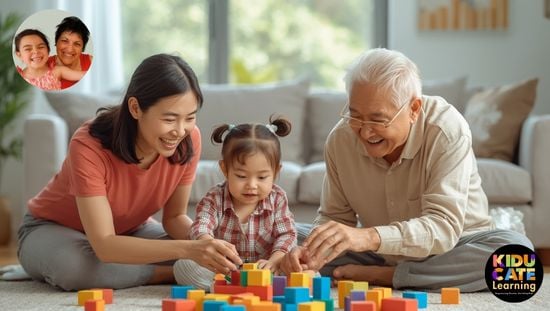Play as Learning in Early Childhood: An Asean Perspective

Imagine a toddler in Hanoi stacking wooden blocks or a preschooler in Jakarta dancing to a nursery rhyme. To an outsider, it may look like “just play.” But developmental science has long confirmed what ASEAN parents are now rediscovering: play is the foundation of learning.
Across Asia, parenting traditions have often emphasised structured learning — academic readiness, discipline, and memorisation. Yet in today’s urban centres, a shift is underway. Parents are asking: Can unstructured play help my child succeed, too?
The answer, according to global research and local practice, is a resounding yes.
🎓 The Science of Play: More Than Fun
- Cognitive Development: Studies from the American Academy of Paediatrics show that play strengthens problem-solving, creativity, and self-regulation (Ginsburg, 2007).
- Language Growth: Pretend play stimulates vocabulary expansion and narrative skills (Bodrova & Leong, 2015).
- Emotional Resilience: Role play helps children practice empathy, frustration tolerance, and emotional expression (Hoffman & Russ, 2016).
👉 For ASEAN parents balancing tradition with modern parenting, this evidence reframes play: it’s not wasted time, but invested time.
🌏 Play in ASEAN Cultures: Old Wisdom, New Norms
Historically, ASEAN families valued storytelling, song, and intergenerational games. In rural Thailand, children learned patience through kite-flying; in Vietnam, folk songs carried cultural knowledge.
Yet rapid urbanisation shifted norms toward structured tutoring and early academics. Now, psychologists and educators across the region are echoing a global truth: play is a form of learning.
Parent voices are key: A recent study found that when parents viewed play as valuable, children showed higher social competence at preschool entry. Fung, C. K. H. (2021).
🧩 Bridging Structured Learning & Free Play
Urban parents in ASEAN often feel torn between enrolling their children in enrichment classes and providing them with downtime. Research suggests the balance matters:
- Guided Play — Teachers/parents introduce themes, but children explore freely (Weisberg et al., 2013).
- Free Play — Child-led exploration fosters independence.
- Structured Play — Games with rules strengthen memory and executive function.
A practical model: 1 hour/day of child-led free play, complemented by shorter blocks of guided play.
👨👩👧 Everyday Ideas for ASEAN Parents
Here are low-cost, culturally relevant play routines for families in busy cities:
- Cooking Together (Vietnam, Indonesia): Measuring rice, stirring soups → numeracy + motor skills.
- Storytelling Circles (India, Thailand): Family elders share folk tales → language + cultural identity.
- Nature Walks (Across ASEAN): Spotting colours, insects, or sounds in small parks → science exploration.
- Imaginative Market Play: Role-playing shopkeepers/customers with real vegetables → math + empathy.
🔗 Internal Links
💬 Community Questions (Cross-Linked to Instagram)
We’d love to hear from you! Share your answers directly on our Instagram post 👉 "In ASEAN homes, play isn’t just fun — it’s how children learn who they are" so parents across the world can benefit. 🌏
- How do you balance structured activities with free play in your family?
- What childhood games from your culture do you want to pass on?
- Have you noticed your child “learning” through pretend play?
At Kiducate Learning, we believe every playful moment plants a seed for lifelong growth. 🌱
Join our circle for thoughtful resources and joyful routines: Subscribe here.
